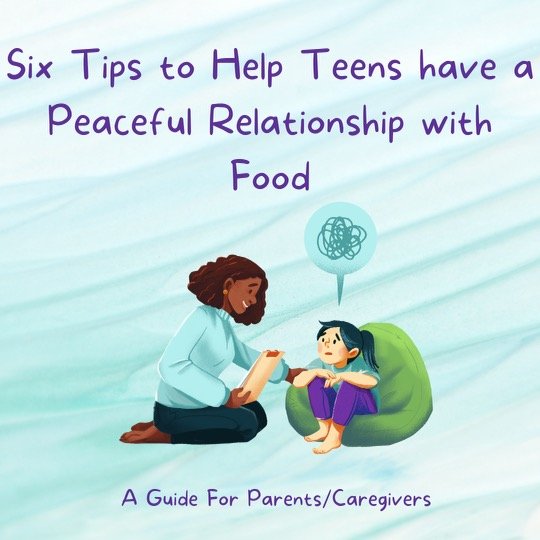Six Tips to Help your Tween Have a Peaceful Relationship with Food
As our children become teens, they take on more responsibility for their own food choices and, at the same time, they have to navigate diet culture, social pressure to be a certain body size, and nutrition misinformation. Nutrition experts encourage parents/caregivers to help their teen develop a flexible, balanced, nourishing, satisfying, and fun relationship with food.
Here are six tips to help your tween develop a peaceful relationship with food:
1. Reflect and correct your own feeling and relationships with food and body image.
Many of us have grown up with the belief that appearance and body shape are more important than our physical and psychological well-being. We are surrounded by negative body talk, body shamming, and pressure to be thin. We have grown up with the idea that restricting what and how much we eat is normal.
Changing these beliefs can be difficult as they have been passed down from generation to generation and have been ingrained. Start by simply being mindful of body related talk about yourself or others and crate a less judgmental environment. Praising weight loss can inadvertently encourage restrictive dieting and disordered eating behaviors and negative body talk can harm self-esteem. Rather, compliment your or others’ bodies for being able to walk, talk, or dance. Or praise others’ for being generous, compassionate, or flexible.
2. Encourage “All Foods Fit” mentality.
There are no “good” or “bad” foods. All foods fit in a total diet. As a parent, we can be gatekeepers of what comes in the house and what is served. It is recommended to provide food on a regular meal schedule, offer a variety of foods, and allow for sweets and fast foods. When parents plan, shop, prepare, and cook family meals, they can let go and can allow their tween eat the amounts they want. This ultimately can prevent battles at the dining table.
3. Acknowledge different shapes and sizes.
There is not one size fits all! All bodies come in different shapes and sizes. Rather than focusing on body shape and size, focus on what our bodies can do. Appreciate that our bodies can digest food, see, run, play, and dance.
4. Normalize weight gain and body changes during puberty.
Like a caterpillar, to a cocoon, to a beautiful butterfly with its very own markings, our bodies go through changes during puberty. Let your Tween know that their bodies are doing what they are supposed to be doing--- growing and gaining weight during puberty. Pressuring tweens to lose weight can be dangerous and stunt their development.
5. Monitor social media.
Recently social media has been scrutinized for its negative impact on Tweens’ brain development. It is important to be aware of who your teens are following and the impact these sites may have on your teen’s self-esteem, body image, and self-worth. Social media can negatively or positively affect our Teens and they need to know that sites that make them feel bad deserve to be unfollowed.
6. Be aware of warning signs.
Often parents state that they did not initially recognize that their Tween may have a problem because they believed their child was “just eating healthier”. Be aware of signs like restricting certain food groups, or eliminating particular types of food, or limiting their intake of certain foods daily. Seek professional help to prevent the onset of disordered eating behaviors or an eating disorder.
Reference: Hazlett, Alex. “How to Help Teens have a Peaceful Relationship with Food”. VOX. Jun 6, 2022.
